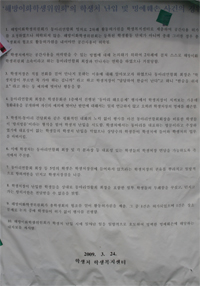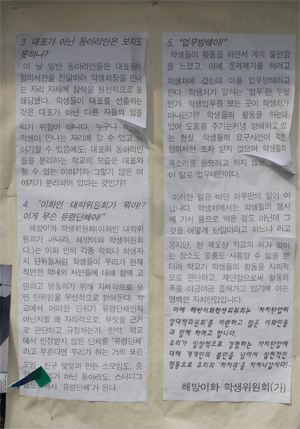The Office of Student Welfare at Ewha posts a daejabo stating that the UCSC's visit was intrusive. 
Conflicts over club autonomy between the Office of Student Welfare (OSW) and the United Committee of Student Clubs (UCSC) have escalated this year. Since the Hae-o-reum festival, the annual spring festival held by Ewha students, conflicts over room reservations have sparked active conflicts between the two groups.
During the Hae-o-reum festival, the representatives of the UCSC and other student clubs visited the OSW with a document listing complaints over the school’s “coercion” toward clubs and demands for improvement. According to comments from the USCS, students were physically blocked by staff, while the dean of the OSW yelled at students and refused to accept the document. After the event, the UCSC posted its document at the first floor of the Student Union Building.
The OSW responded with another daejabo (a hand-written poster) stating that students were “intrusive” and said its actions were appropriate under the circumstances.
The USCS’s complaints center on the room reservation system for student buildings. To reserve a room, students must fill out an online form and get approved from the OSW. The form consists of two sections - an activity section which requires the name, schedule, location, and characteristics of the activity, including the expected attendance of students and the name of the sponsoring organization. A separate section requires the approval of the organization’s faculty advisor. For some facilities, reservations forms are only to be submitted directly to the OSW.
“Until the Hae-o-reum festival, only two of our room reservations were approved. The rejections stated that the contents were ‘not sincere’ and ‘did not correspond to the club’s activities’,” said the USCS president Hong Yeon-Ju. “The approving process is being exploited as a tool to regulate students’ activities.”
While the UCSC insists that the system is misused, the OSW says that the permission system is necessary to maintain effective control over school facilities and to prevent chaos. The OSW also claims that Ewha’s system is not unusual, citing Yonsei University and Seoul National University as the examples of similar system. At Yonsei University, however, students apply to reserve classrooms through the offices in separate buildings and are rejected only if the room is already booked.

The UCSC is especially calling for more autonomy in using the Student Union Building. Hong says that the building was built to be used by students. “But small theater in the building is almost exclusively used for school events. Students find it hard to book the theater, even three months in advance.”
According to the OSW, the small theater in the Student Union Building is mainly used for student activities, like large scale seminars and lectures. “Complete autonomy in the Student Union Building is double-edged sword. If the offices leave the building, it won’t be a place for all students, but for club members only,” said Kim Hye-kyung, a staff member at the OSW.
Among students not involved in club activities, some agree with the UCSC. According to Seo-Boram (Public Administration, 4), the room reservation system is really inconvenient. “To me, it was as if the school does not want students to use the rooms. The procedure is very complicated and not effective for school either.”
Yet, one anonymous comment posted on the UCSC daejabo said, “It is not a matter of ideas but of attitude - peace with the OSW will bring more benefits to Ewha students.”

